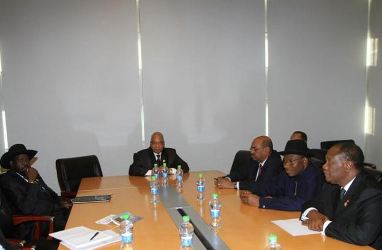Bashir and Kiir commit themselves to implement signed agreements
January 28, 2013 (KHARTOUM) – The presidents of Sudan and South Sudan have committed themselves to implementing the cooperation agreement they signed in September of last year, following a meeting held with several African leaders in Addis Ababa on Sunday.

The meeting was organised following the failure of the two parties to reach a compromise on the implementation of a security deal in a meeting they held last week in Addis Ababa. The two sides also failed to establish local administrative bodies for Abyei.
Before their African counterparts, the two leaders vowed to seek seriously to implement the cooperation agreement and to observe the outcome of the AU Peace and Security Council (AUPSC) meeting held on Friday 25 January at the level of heads of states and governments.
The meeting aimed to put pressure on the two sides, while the AUSPC opted not to refer the issue of Abyei to the UN Security Council (UNSC), preferring instead to keep the issue within the remit of the AU.
In a statement released on Saturday, the regional security body expressed concern over the persistent differences in the implementation of the cooperation agreement, and underscored the different interpretations of the signed deals.
Besides constant disagreements over, Abyei, as well as alleged relations between the South Sudanese government and the SPLM-N rebels north of the border, the two countries recently showed divergent points of view over troop withdrawals in “Mile 14”, a disputed area on the common border.
In a speech at the opening session of the AU meeting,UN secretary-general Ban Ki-moon said the two neighbours “have taken positive steps to resolve outstanding issues, but they should make more progress in meeting their agreements”.
He also called on Sudan and South Sudan to engage in talks over the “dangerous” humanitarian situation in Southern Kordofan and Blue Nile states and to agree on ways to reach the affected civilians in the two states.
Sudan refuses to allow humanitarian access to SPLM-N-held areas in the two regions from neighbouring South Sudan or Ethiopia as the rebels have proposed.
On Sunday, president Bashir also discussed the ongoing process between Sudan and South Sudan with chief mediator Thabo Mbeki, who has worked since 2009 to finalise a peaceful settlement on the differences between Khartoum and Juba.
In a statement to Sudan’s official news agency (SUNA), Mbeki said that the meeting was part of continued consultations with the two presidents Bashir and Kiir over the implementation of the agreements the two countries signed.
The mediator also met with the South Sudanese president to discuss the same issues.
In Khartoum, the ruling National Congress Party (NCP) reiterated that Juba must cut its ties with Sudanese rebels before it allows the exportation of its oil through its territory to resume.
However, it also highlighted the Sudanese government’s commitment to continued talks on the disputed issues within the African framework and reaffirmed its rejection of foreign pressures to allow the exportation of South Sudanese oil.
NCP spokesperson Badr Al-Deen Ahmed Ibrahim expressed hopes the six-month period given to mediation efforts by the AUSPC would be enough to overcome the obstacles hampering the implementation of the cooperation agreement.
Ibrahim also rejected British conditions to write off its debts to Sudan. He said Khartoum signed deals with Juba without “dictates or blackmailing”, adding those who appreciate his government’s efforts should support Sudan without conditions.
The NCP official was reacting to statements by British minister for international development Lynne Featherstone, who was in Sudan last week. Prior to leaving the country on 23 January, she urged Sudan to enforce the agreements signed with South Sudan, end harassment of civil society groups and allow more freedoms in the country.
(ST)
